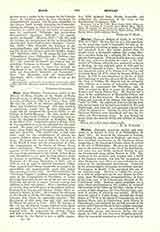

Moye, JOHN MARTIN, VENERABLE, priest of the Diocese of Metz, founder of the Sisters of Divine Providence (q.v.), missionary in China, b. at Cutting, Lorraine, January 27, 1730; d. at Trier, May 4, 1793. He was the sixth of the thirteen children of John Moye and Catharine Demange. His older brother, a seminarian, taught him the first rudiments of Latin, and he completed his classical studies at the College of Pont l Mousson. He then studied philosophy at the Jesuit College of Strasburg, and entered the theological Seminary of St Simon, Metz, in the fall of 1751. Ordained a priest March 9, 1754, he was appointed vicar in the episcopal city the same month. His great zeal for souls attracted attention; many pious ladies placed themselves under his firm and wise direction. This enabled him to find some select souls for the establishment of schools for country children whose education he had much at heart. He began the work in 1763; in 1767 in spite of the illwill of many and the persecutions of a few, the Congregation of the Sisters of Divine Providence was founded. That same year he was appointed superior of the little seminary of St. Die. Leaving the care of his sisterhood to two friends, Father Moye now determined to act upon his long delayed desire to become a missionary. In 1769 he joined the Seminaire des Missions Etrangeres at Paris, and in 1773 he was at work in Oriental Sutchuen, China. Nine years of hard labor, frequently interrupted by persecution and imprisonment, made him realize the necessity of native help. In 1782 he founded the “Christian Virgins”, religious women following the rules of the Congregation of Providence at home, devoting themselves to the care of the sick and to the Christian instruction of pagan Chinese women and children in their own homes. After a hundred years of success, they are still active in the Chinese mission. Exhausted by labors and sickness, Father Moye returned to France in 1784. He resumed the direction of the Sisters of Divine Providence and evangelized Lorraine and Alsace by preaching missions. The Revolution of 1791 drove him into exile, and with his Sisters he retired to Trier. After the capture of the city by the French troops, typhoid fever broke out and, helped by his Sisters, he devoted himself to hospital work. He contracted the virulent disease and died, a martyr of Christian charity, 1793. The spot where he was buried is now a public square.
CAMILLUS P. MAES

